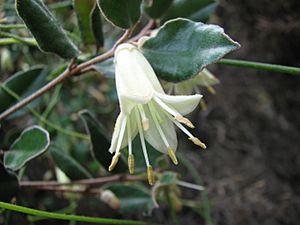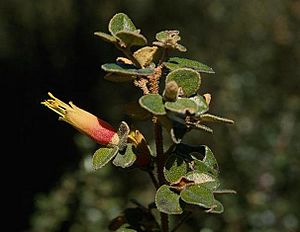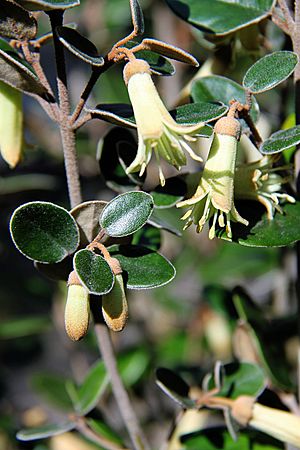Correa backhouseana facts for kids
Correa backhouseana is a type of rounded shrub found only in coastal and nearby areas of southern Australia. It has leaves that can be oval, egg-shaped, or round, and are very hairy on their underside. Its flowers are shaped like cylinders or funnels and can be cream, pale green, or a mix of red and yellow.
Quick facts for kids Correa backhouseana |
|
|---|---|
 |
|
| Correa backhouseana var. backhouseana Cape Otway, Victoria | |
| Scientific classification |
|
| Kingdom: | Plantae |
| Clade: | Tracheophytes |
| Clade: | Angiosperms |
| Clade: | Eudicots |
| Clade: | Rosids |
| Order: | Sapindales |
| Family: | Rutaceae |
| Genus: | Correa |
| Species: |
C. backhouseana
|
| Binomial name | |
| Correa backhouseana |
|
| Script error: The function "autoWithCaption" does not exist. | |
| Synonyms | |
|
|
Script error: No such module "Check for conflicting parameters".

Contents
What Does Correa backhouseana Look Like?
Correa backhouseana is a shrub that usually grows up to 2 meters (about 6.5 feet) tall. Its young branches are covered with soft, rust-colored hairs. The leaves feel like leather and are typically 15–25 millimeters (about 0.6–1 inch) long. They can be oval, egg-shaped, or nearly round, and sit on a short stem. The top of the leaves is mostly smooth, but the bottom is covered with thick, woolly hairs.
Understanding the Flowers
The flowers of Correa backhouseana usually hang downwards. They grow either alone or in small groups of two or three on short side branches. The base of the flower, called the calyx, is shaped like half a sphere and is 2–7 millimeters (about 0.08–0.28 inches) high. It is also covered in woolly hairs. The petals are 15–25 millimeters long and form a tube or funnel shape. Their color can be cream, pale green, or a mix of red and yellow. Inside the flower, there are eight stamens, which are slightly longer than the petals.
How Was Correa backhouseana Named?
The plant Correa backhouseana was first officially described in 1834 by a botanist named William Jackson Hooker. He wrote about it in a science journal called The Journal of Botany. The very first plant sample used to describe the species was collected in 1833 by James Backhouse, an English botanist and missionary, at Cape Grim in Tasmania.
Different Types of Correa backhouseana
There are three main types, or varieties, of Correa backhouseana that are recognized by plant experts in Australia:
- Coast Correa or Velvet Correa: This type is officially called Correa backhouseana var. backhouseana. It has cream-colored flowers and egg-shaped or broadly oval leaves that are smooth on top. You can find it in coastal Victoria and Tasmania.
- Thick-leaf Correa: This variety is known as Correa backhouseana var. coriacea. Its leaves are egg-shaped, and its flowers are red with yellowish tips. It grows in South Australia.
- Round-leaf Kangaroo Island Correa: This type is Correa backhouseana var. orbicularis. It has broadly egg-shaped to round leaves and red flowers with yellowish tips. It is found only on Kangaroo Island in South Australia.
Where Does Correa backhouseana Grow?
This plant grows in several parts of Australia, including Western Australia, South Australia, Victoria, and Tasmania.
Specific Habitats for Each Variety
- Variety backhouseana often grows on sand dunes along the coast and among rocks in coastal Tasmania, the Bass Strait Islands, and near Cape Otway in Victoria.
- Variety coriacea can be found on sand dunes and granite rocks west of the Mount Lofty Ranges in South Australia. It also grows on limestone cliffs along the southeastern coast of Western Australia.
- Variety orbicularis is special because it only grows on Kangaroo Island in South Australia. There, it lives in coastal heathlands on sandy soil, often over limestone.
Is Correa backhouseana Protected?
The Correa backhouseana var. backhouseana is considered "vulnerable" by the Victorian Government. This means it needs protection because its population might be at risk.
How Can We Use Correa backhouseana in Gardens?
Correa backhouseana is a tough plant that can survive temperatures down to -5°C (23°F). It's a good choice for creating a screen or planting along fences. People also grow it in pots, and its flowers and leaves can be used in flower arrangements. This plant prefers some shade and can handle salty winds and frost.
Special Cultivars for Gardens
A special type of Correa backhouseana var. coriacea called 'Eucla Gold' has smaller, narrower, and brighter flowers than usual. This specific plant was found growing wild near Eucla, Western Australia, and started being grown in gardens in Victoria in 1988.
The Correa backhouseana has also received the Royal Horticultural Society's Award of Garden Merit. This award means it's an excellent plant for gardens. In the UK, it needs a protected spot and some winter care.
Images for kids
See also
 In Spanish: Correa backhouseana para niños
In Spanish: Correa backhouseana para niños
 | Janet Taylor Pickett |
 | Synthia Saint James |
 | Howardena Pindell |
 | Faith Ringgold |



